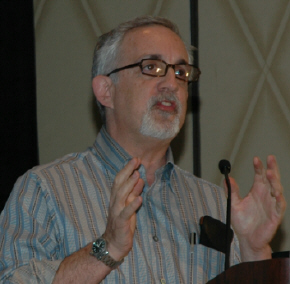Mitch Kapor: Why Wikipedia is the next big thing

At the close of the first day of the Open Source Business Conference, Mitch Kapor explained why he thinks Wikipedia is the next big thing. He first deconstructed the online encyclopedia, which is one of the top 20 Web sites, and punctured holes in myths, such as “someone has to be in charge of things or they don’t work.” 'It's a no brainer to apply to other tasks.' In fact, a recent study showed that Wikipedia is just as accurate as the Encyclopedia Britannica.
Wikipedia is built by a passionate community of contributors around the world with a leader, Jimmy Wales, who is inspirational and empowers the others but doesn’t control the entity. He doesn’t hire or fire anyone and the community itself handles dispute resolution and outreach. It’s counter-intuitive, Mitch said, and kind of a big secret despite it’s there to be seen. “I don’t think Silicon Valley understands the power of Wikipedia, how it works or the opportunities it represents.” he said.

Mitch noted that Wikipedia doesn’t have XML or semantic Web capabilities or a machine accessible way to run a query against information in site, Mitch said, but it would be far more valuable if it were available in that fashion. He mentioned Web 2.0 APIs (mashups) as a powerful way to amplify Wikipedia. But, he added Wikipedians are not technologists and that innovations will come "discontinuously."
He discussed business opportunities he foresees as Wikipedia evolves. “Wikipedia has way of compiling compendiums of information on subjects. It’s a no brainer to apply [the Wikipedia concept and technology] to other tasks.
Wikipedia has chosen not to monetize traffic, but if it just used Google Adsense on it search pages, it could generate hundreds of millions of dollars. Mitch said that despite the contentious nature of the issue, the Wikipedians would eventually get around to monetizing the site.
More than just Wikipedia itself, the underlying dynamic and applying it to other domains could be the basis for interesting, new businesses, Mitch said. He gave examples of a guide to the Web or a compendium of health information created by nurses, doctors and health practitioners around the world. “There are probably 50,000 reference books, so that’s lots of opportunity. If I were pointing someone, this where I would start looking, but there is no cook book or formula,” Mitch noted.
After his keynote, attendees from The Church of Jesus Christ of Latter-day Saints asked Mitch about creating a Wikipedia-like service using its the massive geneology databases.
Compared to collaborative filtering that recommends content or services for users, Wikipedia's collaborative dynamic can result in higher value, Mitch contended. In the Wikipedia world, together the motto is “Be Nice,” “Don’t criticize, improve” and exhibit a neutral point of view (NPOV), which lead to information resources that makes a difference in people's lives.
In terms of business models, Mitch pointed to his experience with Firefox (he is the chairman of the Mozilla Foundation). Firefox has 60 million users a week. If you can command a lot of attention, that’s what is valuable, and many in the commercial ecology would like to have a piece of that attention,” Mitch said. Firefox’s revenue share with Google (the search toolbar in the browser) generates about $50 million a year, he said.
The community should own the knowledgebase, Mitch said. It’s a kind of commons, and not owned by a business organization monetizing the sites. The business organization makes money by commanding the attention of by matching advertisers with users. “The community engages with business partners,” Mitch said. “I think it will be characteristic of the Wikipedia world and form of business that will be more responsible to the larger society.”
“I don’t know how it will turn out, but I feel the opportunity,” Mitch said. As Wikipedia becomes more popular and monetizes its traffic, the spammers, jokers and spin controllers will wreak havoc (such the Seigenthaler incident). Those well known problems will not be easily resolved, but the notion of a self-governing community with a shared vision and passion and some good technology can overcome a lot of obstacles, as Wikipedia has proven so far.
Ross Mayfield has the play-by-play of Mitch's keynote.